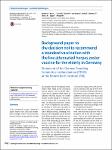Background paper to the decision not to recommend a standard vaccination with the live attenuated herpes zoster vaccine for the elderly in Germany
German Standing Committee on Vaccination (STIKO) at the Robert Koch Institute (RKI)
A live attenuated vaccine (Zostavax®)
against herpes zoster (HZ) and postherpetic
neuralgia (PHN) was licensed for
persons 50 years of age and older in 2006
and became available in Germany in September
2013. Based on the conclusion,
that an effective and sustainable reduction
of the HZ disease burden cannot be
achieved with this vaccine, the STIKO
decided against issuing a recommendation
for routine HZ vaccination at this
time. This decision is based on a systematic
review of available data on the efficacy,
duration of protection, and safety of
the vaccine, and is supported by the results
of health economic modelling. Both,
the risk of developing HZ and the severity
of the illness increase markedly with age.
The efficacy of the vaccine, however, decreases
with advancing age, from 70% for
persons in their 50s to 41% for persons in
their 70s to less than 20% for persons 80
years of age and older. The duration of vaccine
related protection is limited to only
a few years. The modelling results show
only a slight, age-dependent reduction in
the total number of HZ cases through vaccination
with the live attenuated vaccine.
The reduction ranged from 2.6% for persons
vaccinated at the age of 50 to 0.6%
for those vaccinated at the age of 80, based
on assumed vaccine coverage of 35.5%. In
addition to the vaccine’s poor efficacy and
duration of protection, HZ vaccination
does not offer any added value in terms of
herd immunity, since HZ is a disease of an
endogenously reactivated pathogen with
low transmission potential.
Finally, the live attenuated vaccine is
often contraindicated in persons who are
at greatest risk of HZ and its complications.
Thus, in the overall appraisal, the
epidemiological benefit-risk assessment
of the HZ vaccination did not lead to a
recommendation for routine vaccination
with the live attenuated vaccine. An individual
benefit-risk assessment may, however,
lead to a different decision in individual
patients.
No license information

